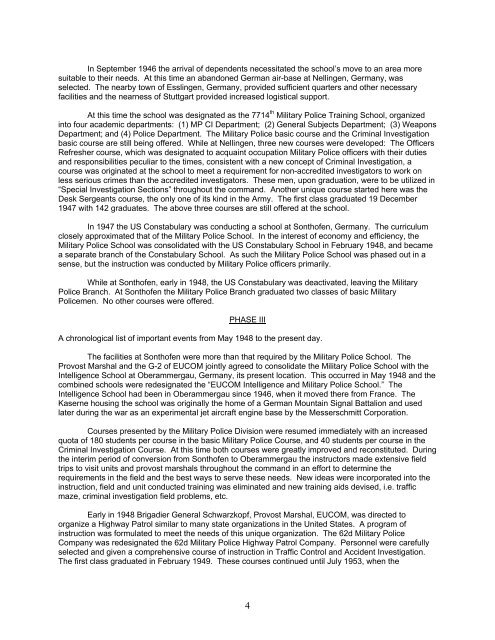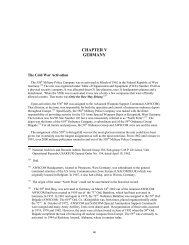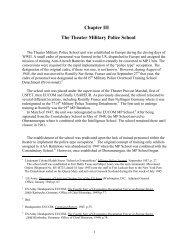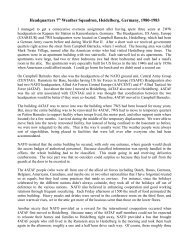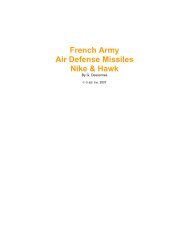The Theater Military Police School - USAREUR Main Page
The Theater Military Police School - USAREUR Main Page
The Theater Military Police School - USAREUR Main Page
You also want an ePaper? Increase the reach of your titles
YUMPU automatically turns print PDFs into web optimized ePapers that Google loves.
In September 1946 the arrival of dependents necessitated the school’s move to an area more<br />
suitable to their needs. At this time an abandoned German air-base at Nellingen, Germany, was<br />
selected. <strong>The</strong> nearby town of Esslingen, Germany, provided sufficient quarters and other necessary<br />
facilities and the nearness of Stuttgart provided increased logistical support.<br />
At this time the school was designated as the 7714 th <strong>Military</strong> <strong>Police</strong> Training <strong>School</strong>, organized<br />
into four academic departments: (1) MP CI Department; (2) General Subjects Department; (3) Weapons<br />
Department; and (4) <strong>Police</strong> Department. <strong>The</strong> <strong>Military</strong> <strong>Police</strong> basic course and the Criminal Investigation<br />
basic course are still being offered. While at Nellingen, three new courses were developed: <strong>The</strong> Officers<br />
Refresher course, which was designated to acquaint occupation <strong>Military</strong> <strong>Police</strong> officers with their duties<br />
and responsibilities peculiar to the times, consistent with a new concept of Criminal Investigation, a<br />
course was originated at the school to meet a requirement for non-accredited investigators to work on<br />
less serious crimes than the accredited investigators. <strong>The</strong>se men, upon graduation, were to be utilized in<br />
“Special Investigation Sections” throughout the command. Another unique course started here was the<br />
Desk Sergeants course, the only one of its kind in the Army. <strong>The</strong> first class graduated 19 December<br />
1947 with 142 graduates. <strong>The</strong> above three courses are still offered at the school.<br />
In 1947 the US Constabulary was conducting a school at Sonthofen, Germany. <strong>The</strong> curriculum<br />
closely approximated that of the <strong>Military</strong> <strong>Police</strong> <strong>School</strong>. In the interest of economy and efficiency, the<br />
<strong>Military</strong> <strong>Police</strong> <strong>School</strong> was consolidated with the US Constabulary <strong>School</strong> in February 1948, and became<br />
a separate branch of the Constabulary <strong>School</strong>. As such the <strong>Military</strong> <strong>Police</strong> <strong>School</strong> was phased out in a<br />
sense, but the instruction was conducted by <strong>Military</strong> <strong>Police</strong> officers primarily.<br />
While at Sonthofen, early in 1948, the US Constabulary was deactivated, leaving the <strong>Military</strong><br />
<strong>Police</strong> Branch. At Sonthofen the <strong>Military</strong> <strong>Police</strong> Branch graduated two classes of basic <strong>Military</strong><br />
<strong>Police</strong>men. No other courses were offered.<br />
PHASE III<br />
A chronological list of important events from May 1948 to the present day.<br />
<strong>The</strong> facilities at Sonthofen were more than that required by the <strong>Military</strong> <strong>Police</strong> <strong>School</strong>. <strong>The</strong><br />
Provost Marshal and the G-2 of EUCOM jointly agreed to consolidate the <strong>Military</strong> <strong>Police</strong> <strong>School</strong> with the<br />
Intelligence <strong>School</strong> at Oberammergau, Germany, its present location. This occurred in May 1948 and the<br />
combined schools were redesignated the “EUCOM Intelligence and <strong>Military</strong> <strong>Police</strong> <strong>School</strong>.” <strong>The</strong><br />
Intelligence <strong>School</strong> had been in Oberammergau since 1946, when it moved there from France. <strong>The</strong><br />
Kaserne housing the school was originally the home of a German Mountain Signal Battalion and used<br />
later during the war as an experimental jet aircraft engine base by the Messerschmitt Corporation.<br />
Courses presented by the <strong>Military</strong> <strong>Police</strong> Division were resumed immediately with an increased<br />
quota of 180 students per course in the basic <strong>Military</strong> <strong>Police</strong> Course, and 40 students per course in the<br />
Criminal Investigation Course. At this time both courses were greatly improved and reconstituted. During<br />
the interim period of conversion from Sonthofen to Oberammergau the instructors made extensive field<br />
trips to visit units and provost marshals throughout the command in an effort to determine the<br />
requirements in the field and the best ways to serve these needs. New ideas were incorporated into the<br />
instruction, field and unit conducted training was eliminated and new training aids devised, i.e. traffic<br />
maze, criminal investigation field problems, etc.<br />
Early in 1948 Brigadier General Schwarzkopf, Provost Marshal, EUCOM, was directed to<br />
organize a Highway Patrol similar to many state organizations in the United States. A program of<br />
instruction was formulated to meet the needs of this unique organization. <strong>The</strong> 62d <strong>Military</strong> <strong>Police</strong><br />
Company was redesignated the 62d <strong>Military</strong> <strong>Police</strong> Highway Patrol Company. Personnel were carefully<br />
selected and given a comprehensive course of instruction in Traffic Control and Accident Investigation.<br />
<strong>The</strong> first class graduated in February 1949. <strong>The</strong>se courses continued until July 1953, when the<br />
4


